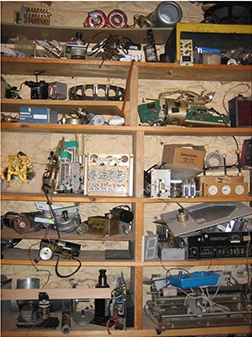Opening reception:
Friday, October 4 | 7:30 pm

"Our bodies change so very slowly we have learned how to evolve outside of our bodies.
Ursula Franklin, a metallurgist and physicist defines technology as “the way we get things done here”.
So, a language is a technology, a pencil is a technology, a Baby Jogger Mini GT2 Stroller is a technology, a cloth baby sling is a technology. Every technology we use seems to affect the relationships we have with each other and the world.
Marshall McLuhan talks about how we made shoes to protect our feet but by wearing them we lose contact with the earth.
What can the things we make do for us? is well covered by advertising. What do the things we make do to us? is the little niche I’m trying to explore.
Currently we seem to be evolving outside of our bodies through electronic things. I’m not smart enough to think about what the latest technologies are doing to us so I use the left-over electronic junk we throw out every three years to follow the technologies’ impact. I try to re-purpose re-program and interconnect E-waste parts to say something about the times we live in. I cut/paste and solder together the internal functions of our junk; memory, process and logic. It’s a collage thing."
Douglas Back has been Technical Director at Trinity Video, a founding member of the YYZ Gallery and InterAccess Electronic Media Arts Centre in Toronto and an advisor to both the Canada Council for the Arts and the Ontario Arts Council. Back's artworks combine kinetic, robotic, and visual media elements to explore technology’s effect on the body. His works have been exhibited across Canada as well as Europe, and the United States. He is Professor at the Ontario College of Art and Design in Toronto, where he teaches in both the Integrated Media and Sculpture/Installation Departments. Back continues to teach the physical computing approach to art practice he developed with Norman White in the 1980s. He was awarded the Petro Canada Award in 1987. (From Douglas Back website).